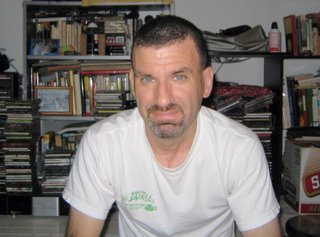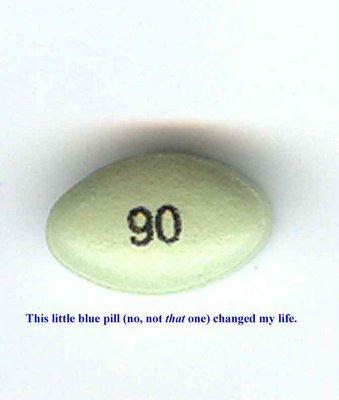
This blog was created Nov. 18, 2005.
I want to use it to open a window on my life and my many interests -- chief among them a passion for Japan. I lived there from 1995-98, teaching English in a rural junior high school and immersing myself in the study of Japanese religions and culture. (Visit my Web site,
http://www.sliceofjapan.com/)
I also want to share my experience of living with parathyroid cancer, an extremely rare and often incurable disease, and how this constant reminder of my own mortality shapes my life and colors my perspective.
First, let me share my medical situation with you in a nutshell. I'll keep it brief, because there are plenty of Web sites you can visit to learn what parathyroid cancer is and what it does. Personally, I stay away from those Web sites because they scare the shit out of me. They deal in statistics and talk about things in gloom-and-doom terms. I'm not a statistic, and this blog is my effort to personalize my struggle.
In 2001, I was a healthy 39-year-old man awaiting the results of a blood test, part of a routine physical.
And then God threw a dart.
The test results showed a disturbing increase in my serum calcium -- the level of calcium in my blood.
This calcium is drawn from the bones, increasing the likelihood of osteoporosis. When there's too much calcium in the blood, organ systems begin to shut down. Seizures and coma can occur. Fatigue and loss of appetite are common, as is impaired memory. Mood swings can occur.
In short, you often feel like shit, and there's nothing you can do about it.
The cancer cells aren't what kill you. It's the catastrophic effect of massive amounts of calcium on your organs that does the job.
Our bodies control calcium levels with four (more in some people) parathyroid glands, pea-size structures in the front of the neck that are attached to each lobe of our bowtie-shaped thyroid gland.
In 1991, I was operated on for a parathyroid adenoma, meaning that one of these glands was overactive. It was producing too much PTH (parathyroid hormone), which regulates the amount of calcium in the body. I was awash in calcium, but this wayward parathyroid gland was fooling my body into thinking that I wasn't getting enough, and was leaching it from my bones.
Surgery removed this overactive gland, and all was well for 10 years. For the vast majority of people with parathyroid disease, one surgery, nowadays performed under local anesthetic in an outpatient procedure, does the trick.
Then came that fateful blood test in 2001.
My internist sent me to an endocrinologist, who did more tests. He thought another parathyroid gland had become overactive.
Surgery in March 2002 removed the suspected gland, and frequent blood tests thereafter monitored my serum calcium.
By that fall, my calcium levels started to rise again, and sharply.
A series of specialized scans of my neck couldn't pinpoint what was wrong, though by now the surgeon who had operated on me in March began to suspect that what was thought to be an abnormal parathyroid, which is not uncommon, was parathyroid cancer, which is extremely rare. Only a few hundred cases each year are diagnosed worldwide.
You're more likely to win the lottery than to develop this illness.
More extensive surgery of my neck was scheduled for February 2003, during which tissue from the part of my neck where the surgeon believed the cancerous cells were located was removed, along with more than 40 lymph nodes.
My blood calcium dipped for a couple of hours, then returned to its dangerously high level.
It was decided that I would wait five weeks for the scar to heal, and then my neck would be reopened to remove more tissue. This time, one of my jugular veins was removed (don't worry, nature equipped us with two).
The surgery had no effect. I asked the surgeon if I was dying, and his carfully worded answer was that if my calcium level couldn't be controlled, then yes, I was dying.
Then I caught a lucky break.
My surgeon heard about a study being conducted to test an experimental drug developed for another illness, but that showed promise in treating people like me. The study was open to people for whom there was no viable surgical option.
The drug manufacturer hoped to find something like 250 people in the United States in circumstances similar to mine.
Thirty were found.
Thirty people out of 280 million.
They even went overseas to fill out our numbers. At the New York hospital at which my group of about eight people was treated, one person came from Brazil, another from Italy. I was the only one who lived in the New York area. I think two of the participants have since died. The person from Brazil dropped out of the study, presumably because of the tremendous expense of having to find housing here so as to be available for a couple of months of weekly blood tests, and monthly follow-up tests after that. The drug company was adamant that those participating in the study had to have all tests connected with the trial performed in the United States, and at only a few selected hospitals nationwide.
When I joined the study in mid-2003 (if memory serves), the drug didn't even have a name. It was called AMG-073. My doctors and I referred to it as "the study drug" in conversation, and we still do, even though it recently was approved by the U.S. Food and Drug Administration. It's now sold under the brand name Sensipar.

It costs $3,500 a month, though I pay $10 under my medical insurance.
The drug succeeded in lowering my calcium levels, which were still high. If you were to suddenly develop the same calcium levels as mine, your body would go into shock and you probably would quickly go into a coma and die.
But because my calcium has risen steadily, but gradually, over the course of a couple of years, my body has somehow adjusted to it, which speaks volumes for our physical resilience.
All this time, I was undergoing regular, very specialized scans that looked for evidence of tumor growth. My calcium continued in the same range, fluctuating between blood tests but remaining relatively steady.
And then, beginning around Christmas 2004, they started rising.
Scans began to show evidence of tumor growth in my chest, which is where parathyroid cancer commonly spreads.
In August 2005, I had my fourth surgery in three years, and my fifth surgery overall. Whereas the others were to my neck, this one was to focus on the very center of my chest.
The surgeon, a different one this time but assisted by the same man who had done the three prior operations, had to saw my breastbone in half. The tumor was located in the back of my chest, near my aorta and up against my esophagus. It was in what is probably the most difficult part of the body to reach for surgery, I was told. It would be akin to working on the engine of a foreign car that requires you to take the whole thing apart just to reach the carburetor.
After the surgery, my calcium level returned to normal for the first time in years. This lasted about eight weeks.
I learned just a few weeks ago that it shot up to its presurgery level.
Because of the difficult location of the tumor, it wasn't possible to remove too much surrounding tissue because it would involve possibly damaging vital structures, such as my aorta.
Thus, enough cancerous tissue was left inside me to wreak havoc on my blood calcium.
I was put back on the study drug, which I had discontinued the day of the surgery. I'm on a lower dose now (twice a day instead of four times), and my serum calcium level has gone down.
Now, I'm waiting to discuss other surgical options with a doctor at an affiliated hospital. My endocrinologists are also investigating immune therapy, which has helped in the two patients on which it was tried.
And that's where I'm at now.
This disease is so rare that there's no protocol, no procedure, for what to do next. There is no book to consult. I and a few other people with this cancer are helping to write the book as we go.
I don't blame my doctors for my bad luck. In fact, I'm eternally grateful to them for doing everything they can, and then some, to try to help me.
We've become very, very close friends, in the process doing away with the clinical detachment that typifies doctor-patient relationships. It almost has to be this way, I think, because this situation is so rare and, in the case of some of my doctors, completely without precedent in their experience. Everyone in the hospital's unit in which I'm treated knows me, if not by name then by face. Same thing in the nuclear medicine department, where I go for scans. I'm kept abreast of personal relationships that are formed, those that end, vacations taken, latest books read. I've been discussed at medical conferences here and abroad, my name replaced by initials and a number. Even the attendants in the hospital parking garage know me. They always have a prime spot for me whenever I pull up.
It's almost as if everyone is trying to compensate for the fact that they're at a loss to cure me.
The thing is, this disease is so rare that it literally doesn't pay for the big drug companies and hospitals to do much research on it. Fair enough.
Physically, I feel fine, thank God. I go to karate class three times a week and routinely take walks of 15 miles or more in the New York City area. Up until my latest surgery, I worked out regularly at the gym (and really need to start going back).
People who know about my situation -- I freely discuss it -- invariably say, "But you look so healthy." This disease is strictly an internal affair. You'd never know what was going on inside me unless I told you.
My doctors and I are sure that my keeping in relatively good physical shape has helped me tremendously. I was let out of the hospital just five days after my August surgery, and was taking a brisk walk the following day. I was back at karate (I'm a brown belt) in two weeks.
It's keeping my spirit in good shape that I have to focus on now.
Remember I said that I went to Japan to study religion? I have a deep interest in and respect for Zen Buddhism. Certain tenets -- ones you really have to feel, because they can't be rationalized or intellectualized -- have been of tremendous comfort to me these past few years. Which reminds me that I really must restart my lapsed meditation practice. (What is done in Zen isn't really meditation, strictly speaking, but that's another topic.)
Hopefully, this blog will offer catharsis for me, and I thank you for reading along.
I look forward to updating it regularly, and I hope you'll stick with me.
Thanks!
Michael










